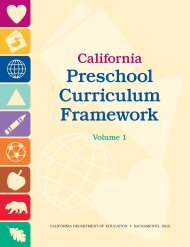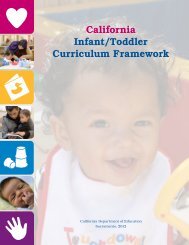California Preschool Learning Foundations - ECEZero2Three ...
California Preschool Learning Foundations - ECEZero2Three ...
California Preschool Learning Foundations - ECEZero2Three ...
Create successful ePaper yourself
Turn your PDF publications into a flip-book with our unique Google optimized e-Paper software.
don’t really want to”) (Curenton and<br />
Justice 2004).<br />
Word-level accomplishments relate<br />
to the child’s manipulation of word<br />
structure for grammatical purposes.<br />
Between two and five years of age,<br />
children acquire the ability to inflect<br />
words to be more precise in meaning.<br />
For instance, one of the earliest wordstructure<br />
achievements (by about two<br />
years of age) is inflecting verbs with<br />
the -ing marker to denote present progressive,<br />
as in “cat jumping” (Brown<br />
1973). By three years of age, children<br />
are using the past tense -ed marker to<br />
denote events occurring in the past, as<br />
in, “I walked” (Brown 1973). As children<br />
develop their comprehension and<br />
use of these verb inflections, they tend<br />
to make errors, as in “He going” (in<br />
which the auxiliary verb is is omitted),<br />
“I wented,” or “He hitted” (in which the<br />
-ed marker is added to an irregular<br />
past tense verb that does not take the<br />
-ed), and Carlos “walkded” (in which<br />
the -ed marker is added twice). Such<br />
errors are entirely commonplace and<br />
typical in early grammatical acquisition<br />
and will gradually be replaced<br />
with more accurate use (Brown 1973).<br />
By five years of age, children are quite<br />
accurate in their inflections of verbs<br />
for past tense, present progressive<br />
tense, and future tense (Brown 1973).<br />
It is important to note that some dialectical<br />
variations in the United States<br />
affect verb inflections. For instance,<br />
children who speak some variations<br />
of African-American English may omit<br />
the plural marker (e.g., two dollar) or<br />
modify the future tense (e.g., “She be<br />
mad”) in ways that differ from Standard<br />
American English but are wholly<br />
appropriate to the individual’s dialect<br />
(Owens 1996).<br />
<strong>California</strong> Department of Education • <strong>Preschool</strong> <strong>Learning</strong> <strong>Foundations</strong>, Volume 1<br />
77<br />
Another type of word-level achievement<br />
emphasized in the foundations is<br />
the child’s development of pronouns.<br />
“Pronouns” are grammatical structures<br />
that serve in the place of nouns. They<br />
include subject pronouns (I, you, he,<br />
she, they), object pronouns (me, you,<br />
him, her, them), possessive pronouns<br />
(hers, his, theirs), reflexive pronouns<br />
(myself, herself), and demonstrative<br />
pronouns (this, that, those). Typically,<br />
children first develop the pronouns to<br />
refer to self (I, me, mine, my) between<br />
18 and 24 months of age (see Owens<br />
1996). Between 24 months and five<br />
years of age, children gradually master<br />
the other pronouns to include a variety<br />
of subject, object, possessive, and<br />
reflexive pronouns. Errors in usage are<br />
very common as children develop their<br />
skills with pronouns, such as, “Her did<br />
it” and “It’s hims” (Owens 1996). With<br />
experience and development children<br />
will typically show few difficulties with<br />
pronouns by the end of the preschool<br />
period.<br />
As indicated concerning the development<br />
of children’s vocabulary,<br />
children’s ability to use increasingly<br />
sophisticated language structures<br />
allows them to make greater use<br />
of “decontextualized language”—<br />
language that requires little reliance<br />
on the context for it to be understood.<br />
By contrast, “contextualized language”<br />
requires context to aid in understanding.<br />
For example, contrast the two sentences:<br />
“He took it” and “That boy over<br />
there took my green ball.” Obviously,<br />
the latter example requires much less<br />
context for it to be understood; likewise,<br />
the latter example also places<br />
a great burden on the speaker to<br />
be linguistically precise. This level of<br />
linguistic precision, required in decon-<br />
LANGUAGE AND LITERACY
















